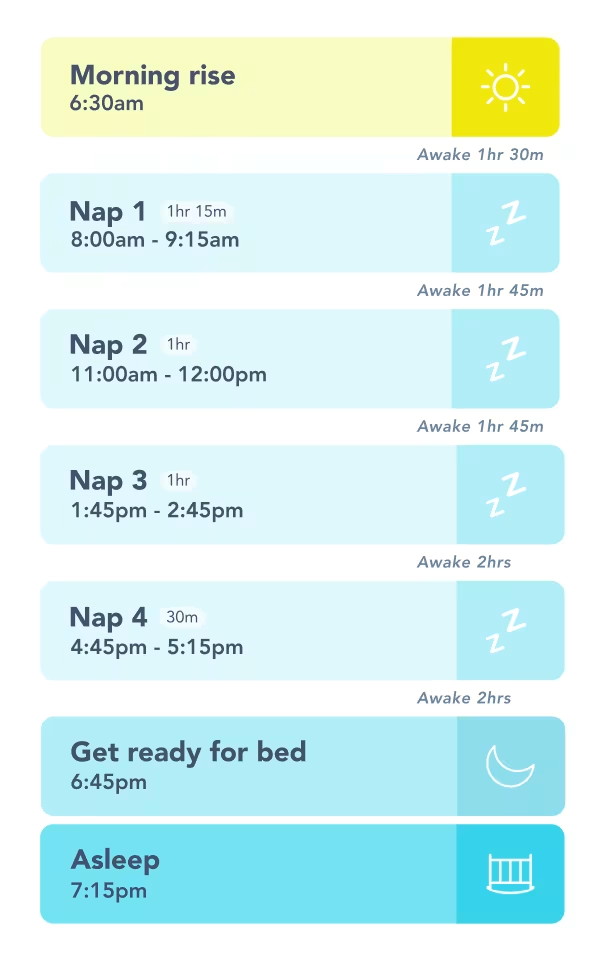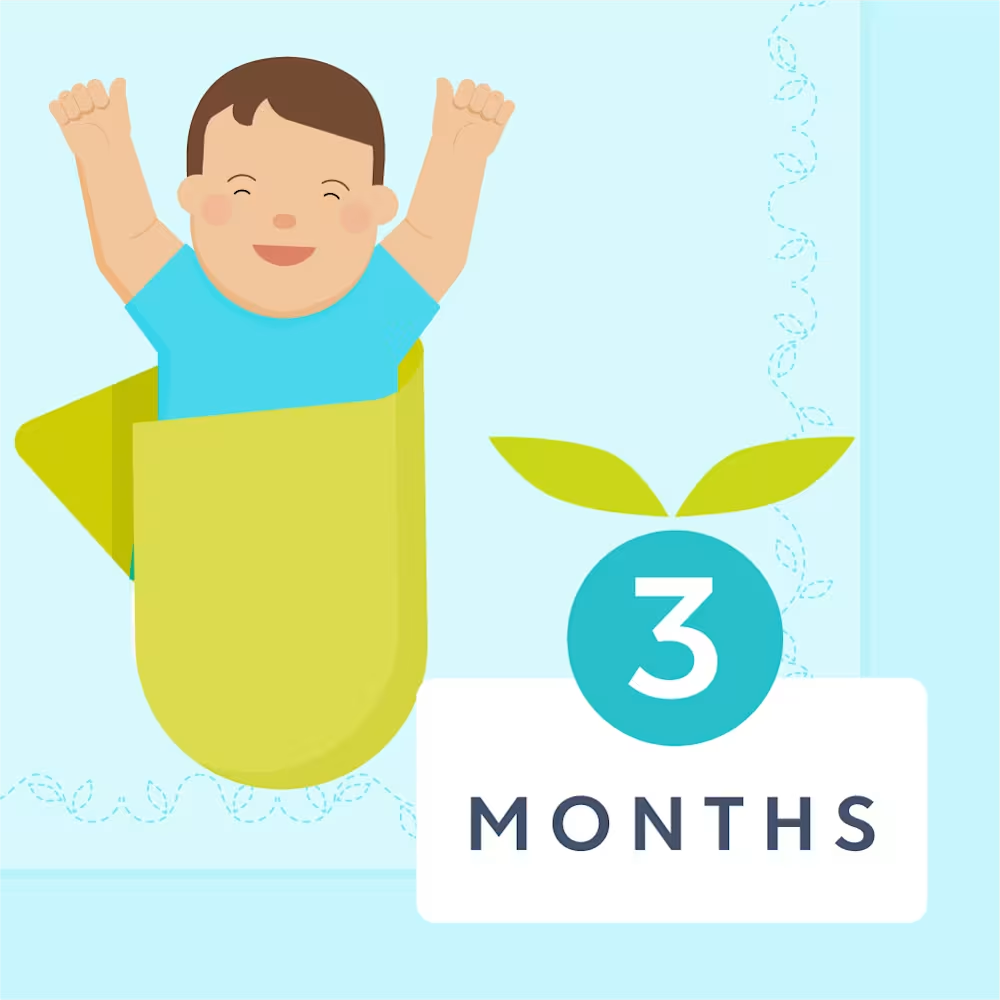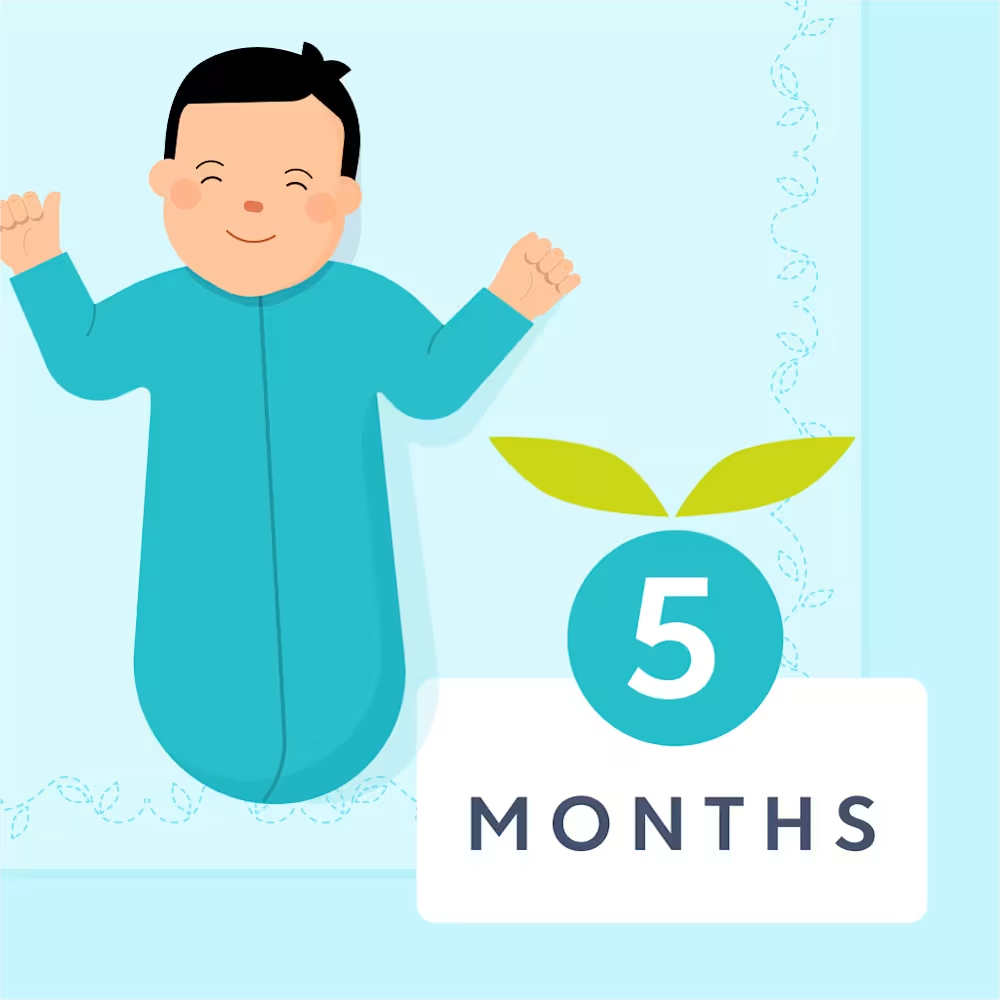4 month old sleep schedule: Bedtime and nap schedule
Updated Feb 27, 2026

Around 4 months old, a big change occurs in a baby’s sleep patterns due to the maturation of the internal clock (aka circadian rhythm). It’s often referred to as the dreaded “.” While this biological change may contribute to some new sleep challenges for your little one, it’s a sign of growth and development — not going backward. In this article, we’ll fill you in on what to expect when it comes to 4 month olds and sleep (including how to help your child sleep during the so-called “4 month sleep regression”) to help ensure your baby gets the rest they need for their growing mind and body.
How much should a 4 month old sleep?
At this age, we recommend aiming for in a 24-hour period. It's worth noting that sleep needs can vary, and there is a range of what's considered normal and healthy. While the recommended hours can provide a general idea, monitoring your child's energy levels and mood is also important.
Here's a quick overview of what you may expect when it comes to 4 month olds and sleep. Note that these figures are averages and should be used as guidelines.
Top sleep tip for 4 month old:
If you’re still swaddling your baby for sleep, it may be time to transition away from this at 4 months due to safety reasons as most babies are showing signs of rolling at this age []. Also, with free hands and their increased motor control at this age, they may now be more able to use their hands or fingers to soothe.
Sample 4 month old sleep schedule

Note: Sleep needs vary by child and this chart should be viewed as an example.
Morning rise: 6:30 AM
Wake window before first nap: 1.5 hours
First nap: 8:00 AM - 9:15 AM (1.25 hour nap)
Wake window before second nap: 1.75 hours
Second nap: 11:00 AM - 12:00 PM (1 hour nap)
Wake window before third nap: 1.75 hours
Third nap: 1:45 PM - 2:45 PM (1 hour nap)
Wake window before fourth nap: 2 hours
Fourth nap: 4:45 PM - 5:15 PM (30 minute nap)
Get ready for bed: 6:45 PM
Wake window before bedtime: 2 hours
Asleep: 7:15 PM
Naptime schedule for 4 month old
How long should a 4 month old nap?
At this age, we can expect to see 3.5 - 4.5 hours of daytime sleep. Try not to feel discouraged if you’re seeing a lot of short naps — it’s common to see naps that are 30 - 45 minutes. The first nap or two of the day may start to lengthen around this time. We recommend limiting each individual nap to no more than 2 hours to ensure that day sleep does not interfere with night sleep.
How many naps should a 4 month old take each day?
Most babies this age need per day. Babies who are already taking longer naps can typically stay awake longer, so they tend to do well on a 3-nap schedule.
On the other hand, if a child takes shorter naps, they’ll get sleepier sooner and are likely to need a 4-nap schedule. Since sleep durations can still be irregular at this age, it’s also common to see babies take some 3-nap days and some 4-nap days in the same week.
3-nap schedule
4-nap schedule
How much awake time should a 4 month old have between naps?
Most babies this age need between 1.5 and 2.5 hours of wakefulness before they are ready for sleep again. Babies with higher sleep needs may do best with shorter wake windows, while those with lower sleep needs might need longer ones. Wake windows can also change throughout the day — often shortest in the morning and longest before bed, though this isn’t always the case.
Bedtime for 4 month old
What’s a good bedtime for a 4 month old?
The appropriate bedtime depends on when your baby wakes up in the morning and how many naps they take. In other words, expect bedtime to still vary at this age. While the start of night sleep should remain somewhat flexible, earlier bedtimes between 6:00 PM and 8:00 PM are common. An early bedtime can help ensure that your 4 month old gets enough sleep and remains well-rested.
Now that your baby is 4 months old, they should be settling into a more regular 24-hour rhythm of sleeping and eating, thanks to a sufficient production of melatonin []. While we don’t expect nap lengths or times to be entirely predictable yet, focusing on a regular wake-up time and a consistent bedtime rituals can help further regulate their schedule.
Why does my 4 month old keep waking up at night crying?
Many babies will wake overnight for one or more feedings at 4 months. However, as they’re able to eat more during the day, night feedings may decrease.
Otherwise, it’s common for 4 month olds to wake up more frequently at night due to a biological shift in the way they sleep. This is often referred to as the “”. Around 3 - 4 months, infants will begin having additional cycles of light and deep sleep and they’ll awaken briefly after each sleep cycle. While normal (adults briefly wake between sleep cycles too!), this may lead to them crying out overnight and/or taking short naps if they’re unable to fall back to sleep on their own.
Is there a sleep regression at 4 months old?
You’ve likely heard of the infamous “.” While it’s dubbed a “regression,” at around 4 months there’s a maturation in how your little one sleeps. Instead of sleeping like a newborn, they’ll graduate to additional cycles of light and deep sleep, similar to an adult. This often results in increased night waking and shorter naps. Instead of a step back, it may be helpful to reframe it as a sign that your baby is growing and developing!
While poor sleep may be a side-effect of this biological change, following an age-appropriate sleep schedule, giving your baby plenty of chances to fall asleep independently, and having a little patience can help get sleep back on track. If you’d like extra support in the sleep department, also consider a step-by-step customized Sleep Plan via .
Can my 4 month old sleep with a pacifier?
Pacifiers can be used during sleep times at 4 months. They may also help soothe your little one during awake times! However, the AAP cautions against using pacifiers to delay or replace feedings that are vital for baby brain development and growth []. Also, some babies never take to a pacifier and that’s OK too.
Should I swaddle my 4 month old?
We recommend transitioning away from swaddling once a baby starts trying to roll or when they’re learning independent sleeping skills. Aside from safety factors, we don’t recommend swaddling at this age because teaching your child how to fall asleep without help is one of the best ways to combat sleep problems caused by the 4 month regression.
If you’re looking to transition away from swaddling, like transitional swaddles and sleep sacks still provide comfort but don’t restrict a child’s arms, making them safe for sleep.
Can I sleep train a 4 month old?
at 4 months can be a valuable step toward better sleep, even if results vary. While many babies won’t consistently fall asleep on their own until closer to 6 months, this is an ideal time to start practicing. Think of it as laying the groundwork for independent sleep — some babies will adapt quickly, while others may need more time. Every baby is different, but introducing sleep training now can set the stage for smoother nights ahead.
Also note that “sleep training” doesn’t necessarily mean “cry it out.” Various range from gradual, gentle techniques to more intense versions that may produce faster results. It’s up to you to choose which may work best for your child’s temperament and your parenting style.
Can a 4 month old sleep on their stomach or side?
Babies at 4 months should be placed on their backs for sleep, as outlined by AAP safe sleep guidelines []. However, if your baby can roll both ways on their own (back to front and front to back), you don’t need to return them to their back if they move to their tummy or side while sleeping. Most babies start to roll around 4 - 7 months [].
What are the developmental milestones for a 4 month old?
As part of , babies are often working on interacting with people and objects in new ways — like smiling, cooing, reaching for toys, and more. There’s a wide range of normal when it comes to baby milestones, but contact your child’s healthcare provider if you suspect any delays or red flags when it comes to their development. You know your baby best! Here are some things your baby may try at this age:
Hold head steady without support
May roll tummy to back
Lift head up 90 degrees while doing tummy time
Reach and grab objects
Hold a toy placed in their hands
Bring hands to mouth
Smile to get your attention
Cry to indicate different needs
Make cooing sounds like “ooo” and “aah”
Turn their head towards sounds
Does a 4 month old need to eat during the night?
Some babies will be able to sleep longer stretches overnight at , however one or more overnight feedings are common at this age. At 6 months, babies may still have . As your little one is able to eat larger amounts during the day, night feedings will decrease.
Reach out to your child’s pediatrician or a lactation consultant for specific guidance when it comes to specific night feeding requirements.
Takeaway
At 4 months, we recommend aiming for around 14.5 hours of total sleep over 24 hours. This typically looks like 11 - 12 hours of night sleep and 3.5 - 4.5 hours of daytime sleep split over 3 - 4 naps. However, every baby is different, so think of this as a guide rather than a strict rule.
There’s a biological shift in the way babies sleep that occurs around 3 - 4 months. This neurodevelopmental change means little ones will have additional cycles of light and deep sleep, similar to an adult. This change may lead to new sleep challenges if your baby isn’t able fall back to sleep when they briefly wake between sleep cycles, which is why you often hear it referred to as the “4 month sleep regression.” However, it’s a sign that your baby is growing and developing!
Short naps are common at this age, however the first nap or two may start to lengthen around this time.
Sleep training at 4 months can be a game changer for some babies, leading to longer stretches of sleep, while others may still need nighttime feedings or comfort. This is a great time to start giving your baby opportunities to practice falling asleep independently, helping to build a strong foundation for healthy sleep. Even if night wakings continue, the skills they develop now can make sleep more predictable in the months ahead.
If you're also curious about what lies ahead in the coming month, glimpse into the future to see what you might experience once your baby is on a. Also take a look back at and see how far your little one has come. 4 month olds are growing and changing so much! Here you can check out various when it comes to growth, speech, motor skills, and more.
Share article:
Note: The content on this site is for informational purposes only and should not replace medical advice from your doctor, pediatrician, or medical professional. If you have questions or concerns, you should contact a medical professional.
5 Sources
Share article:








